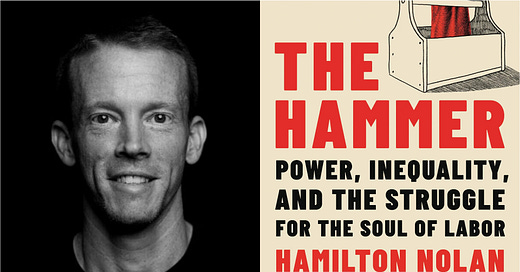An Interview With Hamilton Nolan
The labor reporter and comrade on his new book, the failures of organized labor, and how unions can hold elected Democrats accountable.
For as long as I’ve been reading his writing, which probably started back in (sorry) high school, Hamilton Nolan has been on the side of the little guy. In retrospect, it made perfect sense when he and his colleagues at Gawker Media became the first digital media shop to unionize back in 2015. Nolan and Gawker sparked the movement to organize digital media, which now counts Vox Media, Slate, Bustle Media Group, HuffPost, and Wirecutter, to name just a handful, among its members. Outside of his own organizing, he’s also a longtime labor reporter at outlets like Splinter (where all of us at Discourse Blog worked with him), In These Times, and The Guardian.
He brings all these experiences to his new book The Hammer: Power, Inequality, and the Struggle for the Soul of Labor, where he profiles truly brave people who have fought for years for their seat at the table and grapples with the future of organized labor in America. Hamilton also chronicles some of the failings of the entrenched union establishment—which he argues hasn’t adequately responded to the existential crisis unions are in—as well as how building labor power means building real political power, and how to build a labor movement to last.
I talked to Hamilton earlier this week. You can read our wide-ranging conversation, with light edits, below. (And please do buy his book here.)
First of all, congratulations on writing a book, and thanks for agreeing to speak with Discourse Blog, a maybe-soon-to-be-written-about-in-The-Guardian publication.
Wow, yeah. There couldn't be better timing.
Let's jump in. Right at the opening of your book, I loved your metaphor about how labor should be the sun around which electoral politics, including politicians, orbit and how foreign an idea that is. Do you think that kind of realignment is possible?
I do think it's possible. I think that it makes a lot of sense for most of the American population. It would benefit the vast majority of people in America if we could shift the center of our political power in that direction.
I think that one of the things that makes it a challenge is not just the opposition of capital, obviously, but also some of the failures of the institutions in organized labor themselves to think in that way and try to push us in that direction.
How do you think this realignment could reorder our political parties and our relationship to elections?
One immediate impact it would have would be to reduce the the public's cynicism about politics and to put a halt to this sort of downward spiral that we're in of people losing faith in the political system, losing faith in the American dream and in American institutions. It’s easy to see how that is fueling things like the rise of Trump, because people stopped believing that this system is going to be responsive to them or that they can have an effect on the system, and that's the road to fascism.
So in getting people to think of their own labor power as a source of political power and to put more of their political effort into the labor movement, one of the most tangible things that would do besides pushing our politics in the right direction is just to make people believe in democracy again. It’s a grand statement, but the labor movement can be much more responsive to true democratic political action than our electoral political system can be, and it could be a way to stop that downward spiral before it goes too much deeper.
I feel like, especially after Bernie lost, a lot of people “on the left,” whatever that means, started crowing about electoral politics being “over.” Do you think that's a mistake? In a perfect world, how should organized labor and the left interact with electoral politics?
Keep reading with a 7-day free trial
Subscribe to Discourse Blog to keep reading this post and get 7 days of free access to the full post archives.





